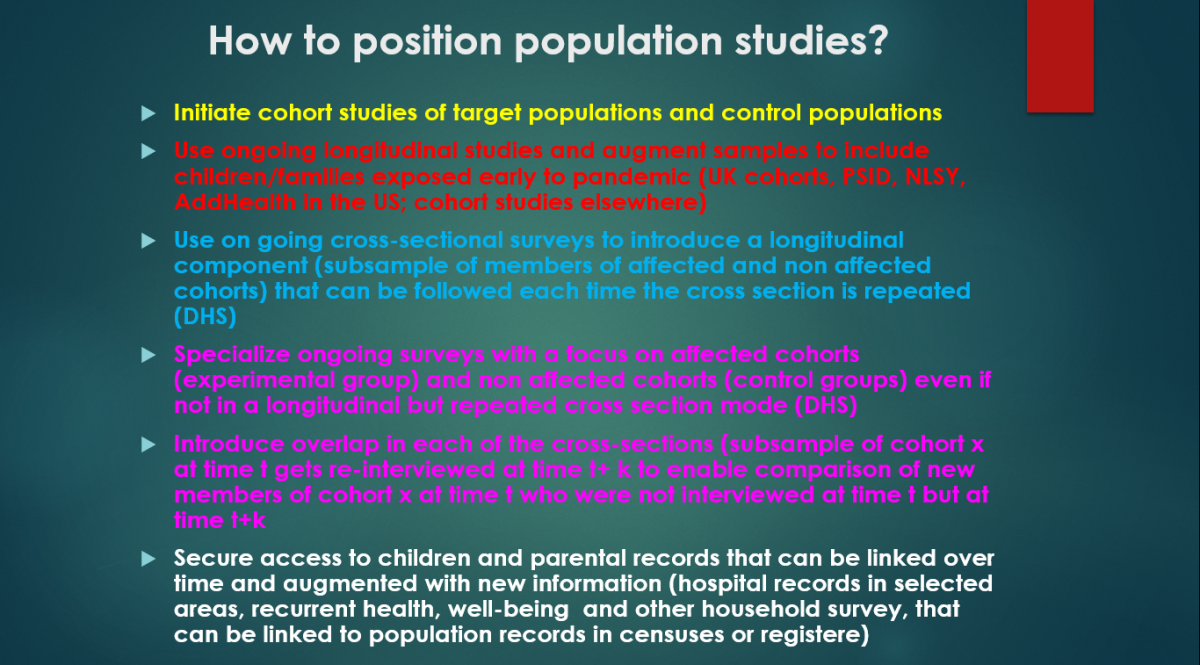New IUSSP Webinar Series:1 - Positioning population studies to understand the short and long-term impacts of the COVID-19 pandemic Zoom, 20 May 2020
In response to COVID-19 and the cancellation of in-person seminars and meetings, the IUSSP has started a webinar series to further IUSSP’s mission of promoting demographic research and exchange during this period when many members are working from home. The webinar series will fill a gap in IUSSP’s regular programme of small in-person seminars and meetings, reaching out to a broader audience of members as well as non-members who rarely have the opportunity to participate in IUSSP seminars or workshops.
The first webinar, “Positioning population studies to understand the short and long-term impacts of the COVID-19 pandemic”, took place on 20 May. Zeba Sathar (Population Council, Islamabad) moderated the round table, which began with a presentation by Alberto Palloni (2019 IUSSP Laureate) followed by contributions from Sonalde Desai (Professor University of Maryland and National Data Innovation Centre in New Delhi), and Parfait Eloudou-Enyegue (Professor, Cornell University).
The premise for the webinar began with a “Blog" written by Alberto Palloni and Stephen Walter. It essentially asks what kinds of data population researchers should be collecting now to understand the long-term impacts of the COVID-19 on this and future generations. The blog emerged from reflections on studies of the 1918 Influenza pandemic and other famines and epidemics, where long-term impacts are known but difficult to trace given the lack of available data. Alberto Palloni focused on the health impacts of early exposure to famine, disease, and mental health challenges caused by such events, and their long-term implications, which can last through to adulthood and be passed on to subsequent generations. He outlined the numerous, mostly negative, impacts and the types of data demographers and population health researchers should be collecting now to understand the consequences of the pandemic 100 years from now.
Zeba Sathar then turned to Sonalde Desai and Parfait Eloundou-Enyegue with questions about the data and analytical tools demographers can bring to understanding the pandemic and how they can contribute to policies to mitigate the impacts of COVID-19, especially in low and middle-income country settings.
Drawing on examples from India, Sonalde Desai focused on what demographers know and have in their tool kit to assist policymakers in addressing the pandemic. These include tools to identify populations that are most at risk and knowledge of processes facilitating disease transmission. As an example of where consideration of demographic processes might have resulted in better policy, she cited the government order for all workers to return to their homes. Home for many workers in urban areas of India is often far away in rural areas and other states. The order forced millions to leave their work to travel long distances, thus likely spreading further the disease rather than containing it. Demographers can also inform mitigation strategies because they have the tools and data to identify occupations most affected by lockdowns. In India, government assistance to relieve poverty mostly focuses on rural areas, but with the COVID pandemic, it is the urban informal sector that is most impacted. She also considered the pandemic’s impact on gender relations and the need for gender-disaggregated data to understand short and long-term effects on gender relations and women in general.
Parfait Eloundou-Enyegue’s comments focused on how demographers should position themselves with other disciplines to understand potential long-term impacts. Demography's interdisciplinarity and a unique bag of analytical tools and data give it a comparative advantage to analyze how the myriad of individual responses to the epidemic shape national outcomes. The COVID-19 pandemic may force us to rethink the endpoint of demographic history as we live out new family, work, and community arrangements we would not otherwise have considered. Demographers are in a unique position to blend big data, personal observation, discourse analysis, polls, and focus groups to look at the long-term responses to the pandemic and the institutional innovations in the arrangement of family, work, and community life that may result.
The webinar ended with speakers’ responses to a few questions crowd-sourced from the many intriguing questions and comments submitted by participants via the Q&A feature.
The webinar attracted over 650 registrations from around the world. Four hundred eleven participants joined for the actual webinar, which was limited to 500 participants.
In starting the webinar series, there was some concern that many of our members based in low and middle-income countries might not have sufficient bandwidth to be able to participate. We were pleasantly surprised that participants were able to join from 63 countries and all regions. Nevertheless, not everyone had a good connection, including some based in North America and Europe. Zoom provides a free call-in option for some countries, and for those who could not make the meeting, be it due to timing or connectivity, you can view the video of the webinar here.
The IUSSP has since presented the 2020 IUSSP Laureate award to Gordon De Jong during a Zoom webinar on 8 June.
Currently, we are planning two webinars for July:
We hope to organize more webinars in the series starting again in September and encourage IUSSP panels as well as members to submit ideas for topics (the webinars do not need to focus on COVID) and speakers to the IUSSP Secretariat (contact@iussp.org) or one of the IUSSP Council members. |

